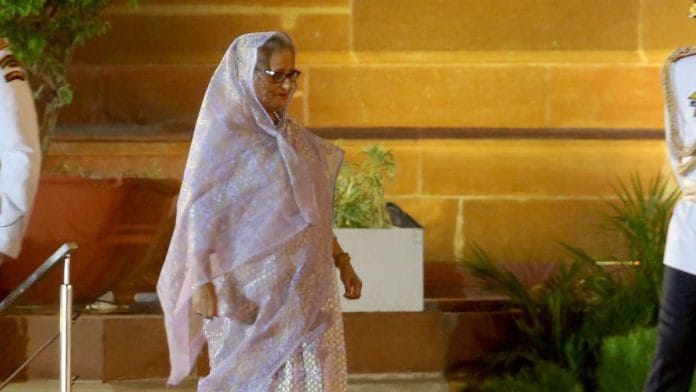New Delhi: The Ministry of External Affairs Monday confirmed that it had received a request from the Bangladesh government for the extradition of former prime minister Sheikh Hasina. This came hours after Dhaka said it had sent a note verbale to New Delhi.
Randhir Jaiswal, the official spokesperson of the MEA, told the media, “We confirm that we have received a note verbale from the Bangladesh High Commission today in connection with an extradition request. At this time, we have no comment to offer on this matter.”
Earlier, Touhid Hossain, Bangladesh’s interim foreign adviser, told reporters at his office in Dhaka, “We have informed India that she [Sheikh Hasina] is wanted back here for the judicial process.”
When pressed, Hossain added that a “note verbale” was sent to New Delhi with the request.
This is the first time that an official extradition request has been sent to India for Hasina’s extradition. The former Bangladesh prime minister fled to India after being ousted from office in August following two-month-long student-led protests. In October, ThePrint reported that had been living in a safe house in New Delhi’s Lutyens Bungalow Zone, arranged for her by the Indian government.
The de facto Home Minister of Bangladesh Jahangir Alam said earlier Monday that his ministry had written to the Indian foreign affairs ministry to facilitate Hasina’s return, according to BSS, the state-run news agency.
Alam had said that she could be brought back through the extradition treaty that exists between the two countries. India and Bangladesh signed an extradition treaty in 2013, and later amended it in 2016.
Under the agreement the two countries are obligated to extradite “persons found in the territory of one of the Contracting States, who have been proceeded against for, or have been charged with or have been found guilty of, or are wanted for the enforcement of a judicially pronounced penalty for committing extraditable offence”.
However, under Article 6 of the agreement, either country could refuse extradition if the offence is of a “political character”. This too has exceptions for offences which are not considered to be of a political character, including murder, culpable homicide, assault, and incitement to murder.
According to media reports, the interim Law Advisor of Bangladesh Asif Nazrul is reported to have said in October that Dhaka would protest against New Delhi if it tried to refuse Hasina’s extradition under provisions of the treaty.
The interim government in Bangladesh has been quite vocal about requesting Hasina’s extradition from India and having her face the courts in Bangladesh for crimes related to the student-led uprising.
The interim government has claimed that roughly 1,500 people were killed during the June- August student protests and close to 20,000 were injured by Hasina’s actions to suppress the movement, according to media reports.
In October, the International Criminal Tribunal (ICT), set up by Hasina to investigate atrocities committed by Pakistani forces during the 1971 Liberation War, issued an arrest warrant for the former prime minister.
(Edited by Sanya Mathur)
Also Read: Sheikh Hasina calls Muhammad Yunus ‘mastermind’ behind mass killings in Bangladesh






